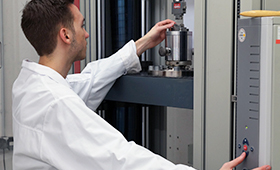Testing and checking to ensure flawless ceramic products
New VET regulations in the occupation of ceramics testing technologist
09/2018 | Bonn, 27.02.2018

Ceramics constitute a broad range of products including crockery, glassware, wash basins, sinks, roof tiles, floor and wall tiles, fireproof vessels for the melding of metals, implants for dentures or bone replacements, brake discs and catalyst carriers. Procedures such as laser analysis, microscopy, thermal shock tests and investigations into microwave or dishwasher suitability are all aimed at ensuring that such items reach consumers in perfect condition. The present and future skills required by those working as testers in the ceramics industry were, however, no longer covered by the old training leading to the qualification of materials tester, which uses training regulations dating back to 1939. For this reason, the Federal Institute for Vocational Education and Training (BIBB) has joined forces with the social partners and experts from occupational practice to draw up a new training regulation for the occupation of ceramics testing technologist on behalf of the Federal Government. These will enter into force on 1 August and will replace the previous occupation.
Ceramics testing technologists support the whole of the ceramics production process. They prepare and extract samples, select suitable testing procedures, set up test stations and carry out the relevant orders. They subsequently evaluate and document the processes conducted. These modern and amended company-based work and test procedures now form the main focus of a training programme whose new occupational title reflects the core of the activity in a contemporary manner. Contents also encompass new information media and systems such as raw materials databases, simulation programmes, the monitoring of test equipment and quality management systems. This makes the occupation of testing technologist a modern and attractive option within the ceramics industry.
Ceramics testing technologists find employment opportunities at companies and institutes involved in the ceramics, glass, enamel, cement and binding materials industries. They may also work at companies and institutes which specialise in the production and investigation of inorganic raw materials, industrial minerals and non-metallic materials.
The three-year training programme is aimed at pupils who have achieved a lower, intermediate or upper secondary school leaving certificate. Candidates should have an interest in mathematics and the natural sciences, possess technical understanding, be able to adopt a careful way of working, have precise observation skills and enjoy being part of a team.
The aim is to support training practice by developing an implementation guide. This will form part of BIBB’s “Structuring training” series and is scheduled for publication in the final quarter of 2018.
For further information, please visit www.bibb.de/de/berufeinfo.php/profile/apprenticeship/241016 (German only)
Contact partner:
Dr. Stephanie Conein
Specimen copy requested if printed.